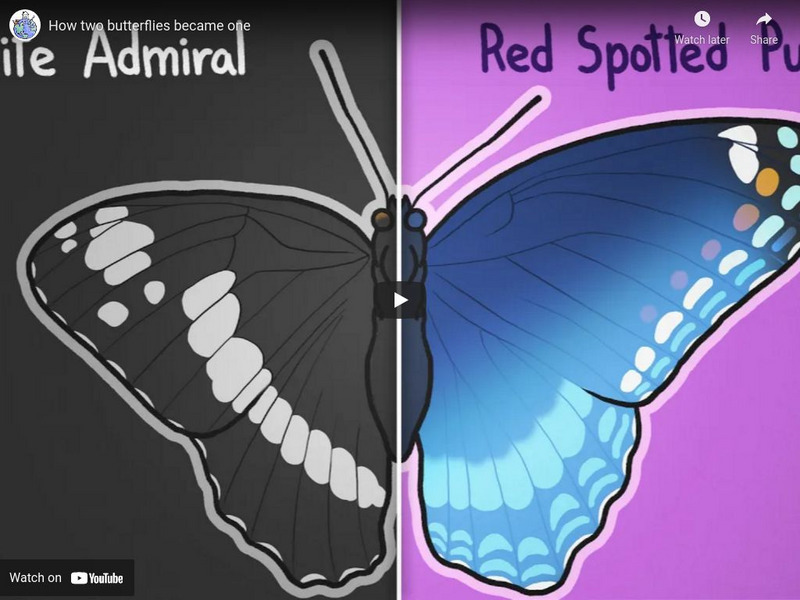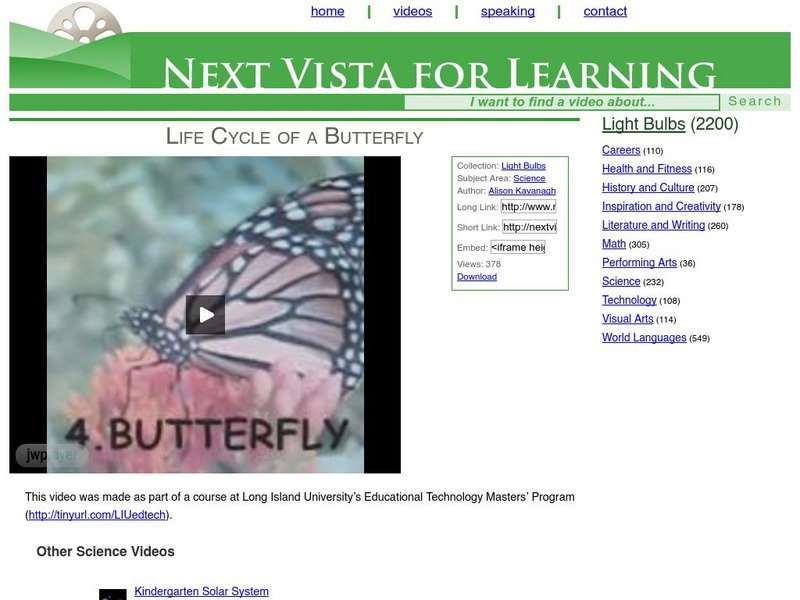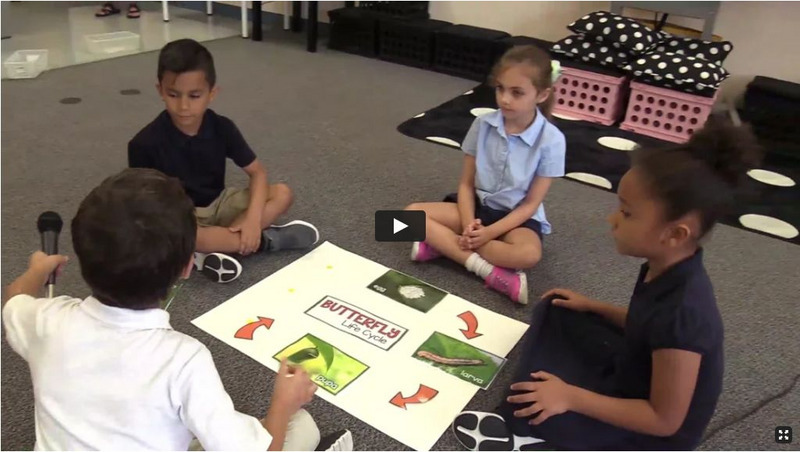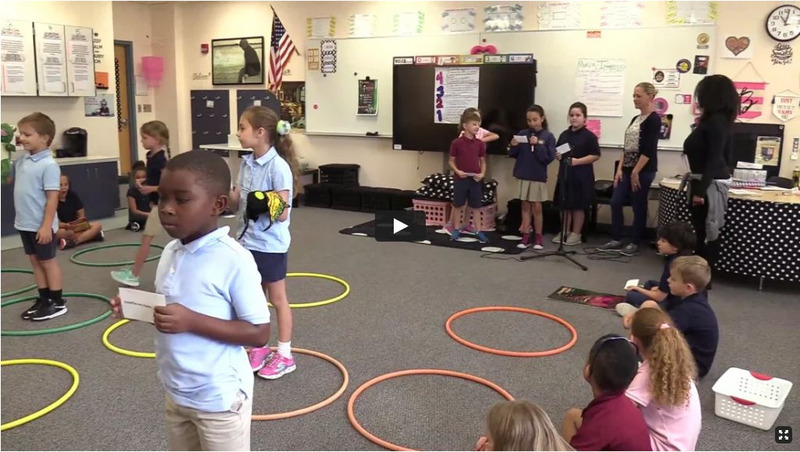Hi, what do you want to do?
Be Smart
Why Is Blue so Rare in Nature?
Why so blue? As it turns out, very few things in nature only reflect blue light! A short video from a comprehensive science playlist highlights the beautiful blues of butterflies, birds, and human eyes. The narrator shows how adaptations...
The Brain Scoop
Insect Adventure, Part 2
Scholars look forward to using the pooter, otherwise known as an aspirator, to collect insects. The video demonstrates how to collect bugs in mesh nets, canvas nets, and in pooters to better study them. The second installment of a...
The Brain Scoop
Moths vs Butterflies
What's the difference between a chrysalis and a cocoon? A chrysalis comes from the butterfly's skin, while a cocoon comes from any nearby materials a moth uses. The Brain Scoop video explains the similarities and differences between...
Deep Look
What Gives the Morpho Butterfly Its Magnificent Blue?
Things are not always as they appear. The morpho butterfly appears to have blue wings, but they don't contain a drop of blue pigment. Learners watch as the instructor explains the physics behind these amazing blue wings.
Deep Look
Why Is The Very Hungry Caterpillar So Dang Hungry?
What would it be like if your only goal in life was eating? See the world from a caterpillar's point of view in an interesting video. Science scholars learn about the life cycle of a butterfly, as well as the distinct functions performed...
MinuteEarth
Are These Butterflies The Same?
A descriptive video lesson explains the history of the white admiral and red-spotted purple butterfly. As the butterflies' habitats overlap, scientists discovered a specimen with characteristics of both butterflies. The narrator...
Curated OER
The Beauty Of Pollination
Beautiful high-definition video footage by Louie Schwartzberg captures the flights of hummingbirds, butterflies, and bees up close. Fruits ripen with time-lapse photography and flowers bloom as these animals, along with bats, seek food...
Sesame Street
Ten: Butterfly
A bright and colorful animated butterfly takes ten petals and rearranges them in this Sesame Street video. The butterfly shows that ten can be 1 group of ten, 2 groups of five and so on. This video demonstrates the value of ten to early...
California Academy of Science
Monarch Migration
It takes four generations of Monarch butterflies to complete the migratory path from the Rockies to Mexico each year, so how do they know where to go? The answer may surprise you; it certainly surprised the scientists who figured it out!...
Curated OER
Life Cycle of a Butterfly
A super cute second grade class tells us all about the life cycle of the butterfly. They read about each stage of the butterfly's life cycle in unison. The choral reading is a little hard to understand but is a great way to engage an...
Curated OER
Butterfly Metamorphosis
Click on this video and you'll get to see the life cycle of a butterfly. Each of the four stages are shown in real-time; as a butterfly lays its eggs, caterpillars emerge from the eggs. The caterpillar cocoons itself and then changes...
PBS
Pbs Learning Media: Wild Kratts: On the Road
Chris and Martin experience the life of a butterfly inlcluding their predators and the need for lots of energy.
PBS
Pbs Learning Media: Metamorphosis: How Frogs, Dragonfiles & Butterflies Grow
All animals develop and grow over time. The animals in this video segment, however, undergo very dramatic changes on their way to adulthood--a developmental process known as metamorphosis. [4:45]
PBS
Pbs Learning Media: Sesame Street: Song: Little Butterfly Friend
Learn about butterflies through this song by Elmo. [1:45]
PBS
Pbs Kids Clubhouse Adventures: Get Up & Go Play!: Monarch Butterfly Tagging
Playing outside makes kids happier, healthier and stronger! In this segment of KIDS Clubhouse Adventures, co-host Abby Brown and kids head out to safely catch, tag and release monarch butterflies as they travel through the Midwest to...
Turtle Diary
Turtle Diary: Learn All About the Butterfly Life Cycle
An animated video illustrates the life cycle of butterflies. [1:43]
Minute Earth
Minute Earth: Are These Butterflies the Same?
This video explains the differences and similarities between the White Admiral and Red-Spotted Purple butterflies. [2:44]
SciShow
Sci Show Kids: How a Caterpillar Becomes a Butterfly
Learn the four stages the caterpillar goes through to become a butterfly. [3:57]
PBS
Nh Pbs: Wildlife Journal Jr: Saving the Karner Blue Butterfly
Learn how scientists in New Hampshire are trying to reclaim habitat and nurture eggs in a quest to save the tiny endangered Karner Blue Butterfly. [8:26]
Next Vista for Learning
Next Vista for Learning: Life Cycle of a Butterfly
A short video showing the stages of the life cycle of a butterfly. See how a butterfly develops from a tiny egg. [0:58]
ArtsNow
Arts Now Learning: Board Game
In this video, students sit around a poster board and state stages in the life cycles of a butterfly and then a frog, placing pictures and other elements on the board that represent each stage. [2:44]
ArtsNow
Arts Now Learning: Physicalizing a Thinking Chart
In this video, students state facts about frogs and butterflies as they each place themselves in hula hoops laid out to organize the similarities, differences, and commonalities between the two organisms. [2:46]






















